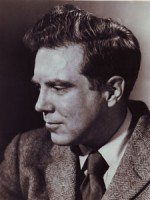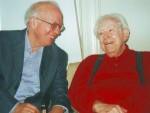Title
Composing for the concert hall may not bring the same acclaim as writing rap songs, but it is very conducive to longevity. The record may have been set by Leo Ornstein, who died in 2002 at 109, but Elliott Carter is catching up, and is in wonderful health. On December 11 he turns 99—which means that he has completed 99 years and starts his 100th. Juilliard’s Focus! festival kicks off his centennial year with “All About Elliott.”
Body
Elliott Carter was born on December 11, 1908, into a wealthy New York family, who took him abroad for extended periods in connection with their lace importing business. As a result, he was fluent in French while still a child. At 11 he entered New York’s Horace Mann High School, whose fine education included modern art and literature. As to modern music, it was now 1922, the very beginning of the first era of modernism in New York. The growing new-music community was hearing the latest European compositions, while American “ultra-modernists” grouped around Edgar Varèse and Henry Cowell opened vistas unimagined in Europe. Prominent older composers included the little-known Charles Ives and Carl Ruggles; younger figures like Aaron Copland and Ruth Crawford (later Seeger) were on the horizon. It was an exciting time for a young composer.
Carter went to Harvard, studying English literature, Greek, and philosophy. Because he found Harvard’s music department stodgy, he pursued music at the nearby Longy School. For his M.A. he stayed at Harvard, where his teachers included Gustav Holst and Walter Piston. He still thought his technique was deficient, however. In 1932 he went to Paris for three years of intensive lessons with Nadia Boulanger and perfected his control of counterpoint. Upon returning to this country Carter became music director for Ballet Caravan, wrote about new music for Modern Music, and got a position at St. John’s College in Annapolis, Md., a very distinguished small liberal arts school. He married the sculptor Helen Frost-Jones in 1939; she died a few years ago. During the war he was among a group of musicians working in the Office of War Information, the American central propaganda unit. Once peace arrived, Carter taught for a year or two at Peabody, Queens College, Yale University, M.I.T., and Cornell. He joined the faculty of Juilliard in 1964, staying with us for two decades. He is now the senior American composer in all senses, the recipient of most important awards in this country and abroad.
Elliott Carter’s music has passed through several important stages, which will be represented in this festival, beginning with early vocal works in a traditional style. The landmark Sonata for Cello and Piano (1948) was a true breakthrough. Although it has a kinship with the somewhat neo-classical Piano Sonata (1945-6), it is permeated with his “tempo modulation” (often referred to as “metric modulation”), his method of effecting smooth transitions between contrasting speeds, which has been a hallmark of his mature music. He also set in motion a decades-long process of differentiating contrapuntal lines so that they have entirely different characters. In 1961 his Double Concerto for Harpsichord and Piano with Two Chamber Orchestras astonished listeners because the instrumental groups operate in different worlds, an idea inspired at least in part by Carter’s admiration for the multilayered music of Charles Ives. Such works have a density that is daunting to performers and listeners, but in superb performances one is bowled over by the extraordinary energy and vivid drama.
His music reached a peak of complexity in the 1980s. Since then it has become less contrapuntal, increasingly transparent, and more lyric. He became fond of giving major solo roles to each player in pieces for large ensemble. Asko Concerto (2000), for example, is constructed like a cross between a Baroque concerto grosso and an orchestral concerto. Players are grouped in solos, duos, trios, and quintets, separated by tutti ritornelli. Carter’s recent solo and chamber works can be extremely surprising to listeners familiar with his earlier dense textures. The 2006 piano piece Caténaires is a monophonic rush of rapid sixteenth notes—a curve hung from two points, as the title says.
About a year ago, my mind lighted on Elliott Carter’s approaching 100th birthday year. It seemed wonderful for Juilliard, his old home, to present a weeklong celebration of his music. I knew he would be especially touched to see Juilliard’s evolution from a bastion of conservatism to a hotbed of innovation where so many students can meet his challenges. Rather than wait until his 100th birthday, we decided to kick off the celebration of his 100th birthday year. Characteristically, President Joseph Polisi immediately embraced the idea of putting Juilliard at the beginning of the line.
A Focus! festival on Elliott Carter promised to solve a longstanding problem. The cello department had been pleading for Carter’s Cello Concerto as a competition piece, but no opportunity had arisen (that is, no conductor had agreed to do it). Since faculty member Joel Krosnick had only recently mentioned it to me again, I called him to verify that there would be at least one capable cellist eager to play the piece. He assured me that there would be a crowd!
That, of course, brought up the question of who would conduct the concluding orchestral concert. After some batting about of names, our incoming dean, Ara Guzelimian, said he would see if he could get James Levine, a great Carter devotee. He did not doubt Maestro Levine’s interest; it was more a matter of his ferocious schedule. Negotiations took many weeks, as Levine’s schedule in January was a bit of a nightmare, but he proposed having rehearsals in the autumn, which had the additional advantage of giving players time to learn the parts. (And he agreed to conduct the Cello Concerto; I shudder to think of what would have happened if he had not, since we had already announced the competition.) He also selected Symphonia, a monumental piece from 1993 composed for the Chicago Symphony but never done in New York. I had hoped he would agree to an early Carter orchestral score, but he preferred Ives’s Three Places in New England as a tribute to Carter’s and Ives’s relationship.
While Dean Guzelimian was still artistic director of Carnegie Hall, he organized a performance by Pierre Boulez’s Lucerne Festival Academy players for Zankel Hall to take place in January 2008. The Lucerne Festival also proposed a joint project between members of the Academy and members of the New Juilliard Ensemble, to be part of the Focus! festival (with a second performance at the Lucerne Festival in September 2008). As a result, Maestro Boulez will conduct the opening Focus! concert with musicians from both ensembles: a program featuring three major pieces by Carter, Varèse’s Intégrales, Stravinsky’s Concertino, and Boulez’s own Dérive I. Incidentally, cellist Victoria Bass and percussionist Alex Lipowski are members of both ensembles.
With the opening and closing concerts settled, I looked forward to choosing the remaining programs. Then I learned that Elliott Carter had already put them together! In June we met to discuss his proposal. It was really good to spend time with him—for, although I don’t see him very often, Mr. Carter and I go back a long way. My earliest memory of him dates to 1971, when he came backstage after a concert. Thinking of him as a supreme intellectual, I was surprised and amused when he congratulated me by saying, with a sweet smile, “Gee, that was swell!” Our June session was equally informal, with some good laughs and pleasant conversation. Some changes were necessary, but nothing caused a problem. One piece was still reserved for the Boston Symphony, while another featured instruments that Juilliard students do not play. There seemed to be an oversupply of pieces for oboe, whose four senior players had graduated in May. Mr. Carter wanted to avoid too many pieces that were likely to have many performances during the birthday year, and to give less well known pieces a chance. As the Pacifica Quartet was scheduled to play all five string quartets at the Chamber Music Society of Lincoln Center on the Wednesday during the Focus! week, we agreed not to have those pieces in the festival (and not to have a concert on Wednesday night, to avoid a conflict). Instead, we shall have one early and two recent, short pieces for quartet. On Tuesday night the New Juilliard Ensemble will give a concert with players not participating in the Boulez project; on Monday, Thursday, and Friday there will be concerts of chamber, solo, and vocal music.
We hope that music lovers will avail themselves of this remarkable opportunity to hear nearly the full range of Elliott Carter through the ears, hands, and imaginations of some of the planet’s most amazing young performers. I like to think that only Juilliard could mount such a challenge.






